
If there’s one public domain novel I don’t mind seeing endless re-releases and re-recordings of it’s this one…
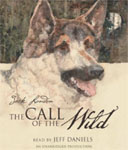 The Call Of The Wild
The Call Of The Wild
By Jack London; Read by Jeff Daniels
CDs – Approx. 3 Hours 12 Minutes [UNABRIDGED]
Publisher: Random House Audio
Published: May 25, 2010
ISBN: 9780307710260
Sample |MP3|
Jack London’s The Call Of The Wild was written in 1903, but Buck’s gripping adventure makes for a thrilling listen on audio more than 100 years after it was first published. This gripping story follows the adventures of the loyal dog Buck, who is stolen from his comfortable family home and forced into the harsh life of an Alaskan sled dog. Passed from master to master, Buck embarks on an extraordinary journey that ends with his becoming the legendary leader of a wolf pack.
Now this should be interesting…
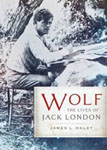 Wolf: The Lives of Jack London
Wolf: The Lives of Jack London
By James L. Haley; Read by Bronson Pinchot
10 CDs or 1 Mp3-CD – Approx. 13 Hours [UNABRIDGED]
Publisher: Blackstone Audio
Published: May 25, 2010
ISBN: 9781441758965 (cd), 9781441758972 (mp3-cd)
Jack London was born a working-class, fatherless San Franciscan in 1876. In his youth, he was a boundlessly energetic adventurer on the bustling west coast—by and by playing the role of hobo, sailor, and oyster pirate. From his vantage point at the margins of Gilded Age America, he witnessed such iniquity and abuses that he became a life long socialist and advocate for reform. His adventures in the American wilderness and underworld informed his fiction, and his writing came to captivate the nation as it defined his era. Within his own short lifetime, London became the most popular, and bestselling, author of his generation. By adulthood he had matured into the iconic American author of such still-universally loved books as The Call Of The Wild, White Fang, and Sea Wolf, but in spite of his success, he was at war with himself. The highest-paid writer in America, he was constantly broke. Famous as he was for conjuring the brutality of nature in story after story and novel after novel, upon the actual deaths of his favorite animals he would dissolve into helpless tears. Sick, angry, and disillusioned, after a short, breathless life, he passed away at age forty, but he left behind him a glorious literary legacy. Award-winning author James L. Haley explores the forgotten Jack London—a man bristling with ideas, whose passion for social justice roared until the day he died. In Wolf, Haley returns Jack London to his proper place in the American pantheon, resurrecting the author of White Fang in his full fire and glory.
Made by makers…
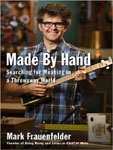 Made by Hand: Searching for Meaning in a Throwaway World
Made by Hand: Searching for Meaning in a Throwaway World
By Mark Frauenfelder; Read by Kirby Heyborne
7 CDs or 1 MP3-CD – Approx. 8 Hours [UNABRIDGED]
Publisher: Tantor Media
Published: June 07, 2010
ISBN: 9781400117819 (cd), 9781400167814 (mp3-cd)
From his unique vantage point as editor in chief of Make magazine, the hub of the newly invigorated do-it-yourself (DIY) movement, Mark Frauenfelder takes listeners on an inspiring and surprising tour of the vibrant world of DIY. The Internet has brought together large communities of people who share ideas, tips, and blueprints for making everything from unmanned aerial vehicles to pedal-powered iPhone chargers to an automatic cat feeder jury-rigged from a VCR. DIY is a direct reflection of our basic human desire to invent and improve, long suppressed by the availability of cheap, mass-produced products that have drowned us in bland convenience and cultivated our most wasteful habits. Frauenfelder spent a year trying a variety of offbeat projects, such as keeping chickens and bees, tricking out his espresso machine, whittling wooden spoons, making guitars out of cigar boxes, and doing citizen science with his daughters in the garage. His whole family found that DIY helped them take control of their lives, offering a path that was simple, direct, and clear. Working with their hands and minds helped them feel more engaged with the world around them.
Frauenfelder reveals how DIY is changing our culture for the better. He profiles fascinating “alpha makers” leading various DIY movements and grills them for their best tips and insights. Beginning his journey with hands as smooth as those of a typical geek, Frauenfelder offers a unique perspective on how earning a few calluses can be far more rewarding and satisfying than another trip to the mall.
I always bet on the man with the bigger mustache…
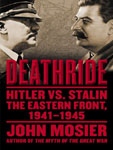 Deathride: Hitler vs. Stalin—the Eastern Front, 1941-1945
Deathride: Hitler vs. Stalin—the Eastern Front, 1941-1945
By John Mosier; Read by Michael Prichard
10 CDs or 1 MP3-CD – Approx. 12.5 Hours [UNABRIDGED]
Publisher: Tantor Media
Published: June 15, 2010
ISBN: 9781400117369 (cd), 9781400167364 (mp3-cd)
John Mosier presents a revisionist retelling of the war on the Eastern Front. Although the Eastern Front was the biggest and most important theater in World War II, it is not well known in the United States, as no American troops participated in the fighting. Yet historians agree that this is where the decisive battles of the war were fought. The conventional wisdom about the Eastern Front is that Hitler was mad to think he could defeat the USSR because of its vast size and population, and that the Battle of Stalingrad marked the turning point of the war. Neither statement is accurate, says Mosier; Hitler came very close to winning outright. Mosier’s history of the Eastern Front will generate considerable controversy both because of his unconventional arguments and because he criticizes historians who have accepted Soviet facts and interpretations. Mosier argues that Soviet accounts are utterly untrustworthy and that accounts relying on them are fantasies. Deathride argues that the war in the East was Hitler’s to lose, that Stalin was in grave jeopardy from the outset of the war, and that it was the Allied victories in North Africa and consequent threat to Italy that forced Hitler to change his plans and saved Stalin from near-certain defeat. Stalin’s only real triumph was in creating a legend of victory.
We’ve talked about it on the podcast, and here it is…
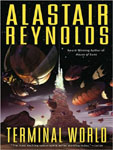 Terminal World
Terminal World
By Alastair Reynolds; Read by John Lee
15 Audio CDs or 2 MP3-CDs – Approx. 19.5 Hours [UNABRIDGED]
Publisher: Tantor Media
Publisher: June 1, 2010
ISBN: 9781400117116(cd), 9781400167111 (mp3-cd)
Spearpoint, the last human city, is an atmosphere-piercing spire of vast size. Clinging to its skin are the zones, a series of semi-autonomous city-states, each of which enjoys a different—and rigidly enforced—level of technology. Following an infiltration mission that went tragically wrong, Quillon has been living incognito, working as a pathologist in the district morgue. But when a near-dead angel drops onto his dissecting table, Quillon’s world is wrenched apart one more time. If Quillon is to save his life, he must leave his home and journey into the cold and hostile lands beyond Spearpoint’s base, starting an exile that will take him further than he could ever imagine. But there is far more at stake than just Quillon’s own survival, for the limiting technologies of the zones are determined not by governments or police but by the very nature of reality—and reality itself is showing worrying signs of instability.
Death Cloud is the first in a series of novels in which Sherlock Holmes is re-imagined as “a brilliant, troubled and engaging teenager”…
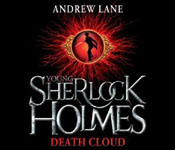 Young Sherlock Holmes: Death Cloud
Young Sherlock Holmes: Death Cloud
By Andrew Lane; Read by Dan Stevens
3 CDs – Approx. 3 Hours [ABRIDGED?]
Publisher: Pan Macmillian Audio
Published: June 2010
ISBN: 9780230745124
The year is 1868, and Sherlock Holmes is fourteen. His life is that of a perfectly ordinary army officer’s son: boarding school, good manners, a classical education – the backbone of the British Empire. But all that is about to change. With his father suddenly posted to India, and his mother mysteriously ‘unwell’, Sherlock is sent to stay with his eccentric uncle and aunt in their vast house in Hampshire. So begins a summer that leads Sherlock to uncover his first murder, a kidnap, corruption and a brilliantly sinister villain of exquisitely malign intent…
[via Bish’s Beat]
Posted by Jesse Willis








